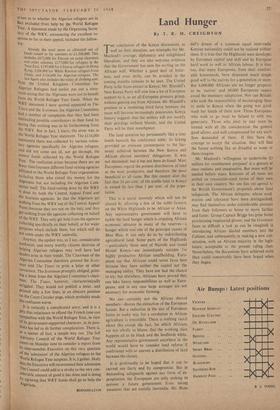Land Hunger
By T. R. M. CREIGHTON
THE conclusion of the Kenya discussions, as well as their duration, are triumphs for Mr. Macleod's courage, diplomacy and enlightened liberalism; and they are also welcome evidence that the Government has seen the writing on the African wall. Whether a good deal of bitter- ness, and even strife, can be avoided in the coming months remains to be seen. The United Party is far from extinct in Kenya; Mr. Blundell's New Kenya Party will now lose a lot of European support to it, as an all-European pressure group. without gaining any from Africans. Mr. Blundell's position as a mediating third force between the races will become increasingly precarious. Kenya history suggests that the settlers will not modify their privilege without bluster; and the United Party will be their mouthpiece.
The land question lay permanently like a time bomb beneath the conference table; its ticking provided an ominous counterpoint to the har- mony achieved between the New Kenya and African elected members' deleg,#tions. It was not detonated; but it has not been de-fused. Most Europeans regard the present distribution of land as the most productive, and therefore the most beneficial to all races. But this cannot alter the fact that 24 per cent. of the arable land in Kenya is owned by less than I per cent, of the popu- lation.
This is a social anomaly which will not be altered by allowing a few of the 4,000 farmers on the White Highlands to be African or Asian. Any representative government will have to tackle the land hunger which is crippling African economic advance in many of the reserves—a hunger which wai one of the principal causes of Mau Mau. It can only do so by redistributing agricultural land. Some parts of the Highlands —particularly those west of Nairobi and round Mount Kenya—are immediately suitable for highly productive African smallholding. Euro- peans say that Africans could never farm here because they have neither the capital nor the managing ability. They have not had the chance to try; but elsewhere, Africans have proved they can take heavy responsibilities as well as Euro- peans; and in any case large acreages are not necessary for economic farming.
No one—certainly not the African elected members—desires the extinction of the European farmer. But a reduction in the size of European farms to make way for a revolution in African agriculture is irresistible. There is nothing racill about this except the fact, for which Africans are not wholly to blame, that the working class happens all to be black and the landlords white. Any representative government anywhere in the world would have to consider land reform if confronted with so uneven a distribution of land between the classes.
It is profoundly to be hoped that it can be carried out fairly and by compromise. But in demanding safeguards against any form of ex- , propriation the Europeans are only seeking to prevent a future government from taking measures that are socially inevitable. Mr. Blun-
dell's dream of a common equal inter-racia' Kenyan nationality could not be realised withow them. It is true that the Highlands were developec by European capital and skill and by European hard work as well as African labour. It is true too, that many Europeans, from their comfort- able homesteads, have dispensed much simple good will to the natives for a generation or more But 6.000,000 Africans are no longer prepared to be 'natives' and 60,000 Europeans cannot avoid the necessary adaptation. Nor can Britain.
who took the responsibility of encouraging them to settle in Kenya when the going was good wash her hands of them now. Those Europeans who wish to go must be helped to with rea: generosity. Those who elect to stay must be treated with all the consideration the general good allows, and well compensated for any sacri- fices demanded of them. If they have the courage to accept the situation, they will find the future nothing like so dreadful as some ot them imagine.
„Mr. Macleod's 'willingness to underwrite £5 million for resettlement purposes' is a gesture at once realistic and imaginative. But more will be needed before many Kenyans of all races are settled on reasonable-sized farms of their own
in their own country. No one has yet agreed to
the British Government's proposals about land safeguards. The African delegates, whose mod- eration and tolerance have been distinguished, may find themselves under considerable pressure from their followers at home to move farther and faster; Group Captain Briggs has gone home proclaiming inspissated gloom; and the Governor faces as difficult a task as can be imagined in introducing African elected members into the Cabinet, and subsequently in making a new con- stitution, with an African majority in the legis- lature, acceptable to the present ruling class.
Nevertheless, the discussions have achieved more than could conceivably have been hoped when they began.


































 Previous page
Previous page